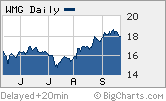 |
| Bittersweet symphony? Warner Music Group has fared well on Wall Street since its IPO in May. But can the good times last? |
|
 |
| Savior or executioner? Digital downloads could be a boon for music companies but Apple CEO Steve Jobs recently warned the industry to not get "greedy" and push for price increases of song downloads on stores like Apple's iTunes. |
|
|
|
|
|
|
|
|
|
NEW YORK (CNN/Money) � These aren't good times for the music industry.
Sure, music sales in the United States (including all formats: compact discs, cassettes, vinyl and downloads) rose 2.5 percent in 2004, according to the Recording Industry Association of America.
But that follows four straight years of declining revenue. Last year's $12.2 billion in sales is still nearly 17 percent below the $14.6 billion's worth of music sold in 1999.
The industry is still fighting online piracy while trying to figure out the best way to make money from legal downloads. But one of its biggest online allies in this fight, Apple's iTunes music store, seems resistant to raise prices.
At a speech in Paris this week, Apple (Research) CEO Steve Jobs cautioned the industry to not be "greedy". He said the model of selling songs for 99 cents works and argued that consumers would be unwilling to pay more for music.
So with all this in mind, why are shares of Warner Music Group (Research), the only publicly traded pure play record label in the United States, up more than 20 percent since mid-July?
Investors need to face the music
Warner Music Group, which used to be the wholly-owned music subsidiary of Time Warner (Research), is now headed by media mogul Edgar Bronfman, Jr. (Time Warner owns CNN/Money.)
Bronfman and a group of investors, including buyout firms Bain Capital and Thomas H. Lee Partners, bought the unit from Time Warner in 2004 for $2.6 billion and brought the company public in May.
Laura Martin, an analyst with independent research firm Soleil--Media Metrics, said fundamentals for the music industry appear to be improving thanks to recent legal victories against peer-to-peer file-sharing services like Grokster and Kazaa, which many people have used to download music for free.
"So long as you believe piracy has stabilized, new digital revenue streams should drive growth in music revenue over the next 3 years," she said.
Another reason the stock may have popped lately is due to increased speculation that Warner Music could be acquired by rival EMI Group, based in London.
Still, P.J. McNealy, an analyst with American Technology Research, said investors shouldn't hold their breath waiting for a deal since this rumor was making the rounds when Time Warner still owned Warner Music.
"Speculation about an EMI-Warner deal has been out there for five years and it will continue," he said.
Takeover scuttlebutt aside, there's little to be excited about. McNealy has a "hold" rating on the stock and said that until there is more clarity about how big of a business downloads can be for music companies, he'd be wary. "Digital distribution models aren't proven," he said.
Even though online music sales are growing rapidly at Warner Music, they accounted for less than 6 percent of total sales in its last quarter, McNealy noted.
McNealy also said that there could be downward pressure on the stock once the lock-up period for company insiders expires, scheduled for mid-November. As is the case with most initial public offerings, a certain number of shares are not allowed to be sold in the first few months following the IPO.
Premium price for little growth
There's also the Apple issue. The company has revolutionized the music industry with its popular iPod music players and iTunes songs. But with this comes more power to negotiate prices on its own terms. So Apple is a blessing and a curse for companies like Warner Music.
"With Apple's dominant market share, we believe music companies such as Warner Music and EMI, have very little power to alter pricing from the current $0.99 level (with Apple more focused on selling iPods than increasing profitability of digital track sales for the music labels)," wrote Richard Greenfield, an analyst with Fulcrum Global Partners in a research note earlier this month.
Finally, there's the issue of Warner Music's growth prospects and valuation. According to analysts surveyed by Thomson/First Call, sales are expected increase by just 2 percent in fiscal 2006, which ends next September, and 4 percent in fiscal 2007.
Analysts are predicting that earnings before interest, taxes, depreciation and amortization (EBITDA), a commonly used yardstick for measuring profitability at media companies, will be essentially flat in fiscal 2006 and up just 2 percent the following year.
Yet, Warner Music Group trades at about 9.4 times 2006 EBITDA estimates. That's a premium to more diversified, and faster-growing, media companies like Walt Disney (Research), Time Warner and Viacom (Research) which trade in a range of 8.3 to 9.1 times next year's EBITDA forecasts.
Charging a steep price for a mediocre product may be the model the music industry thrived on for years. But that won't work on Wall Street for long. So investors buying shares of Warner Music now probably won't be whistling (or downloading) a happy tune anytime soon.
For a look at more media and entertainment stocks, click here.
For more personal technology news, click here.
Analysts quoted in this story do not own shares of the companies mentioned and their firms have no investment banking ties with the company.
The reporter of this story owns shares of Time Warner through his company's 401(k) plan.
Sign up to receive the Tech Biz column by e-mail.
Plus, see more tech commentary and get the latest tech news.

|